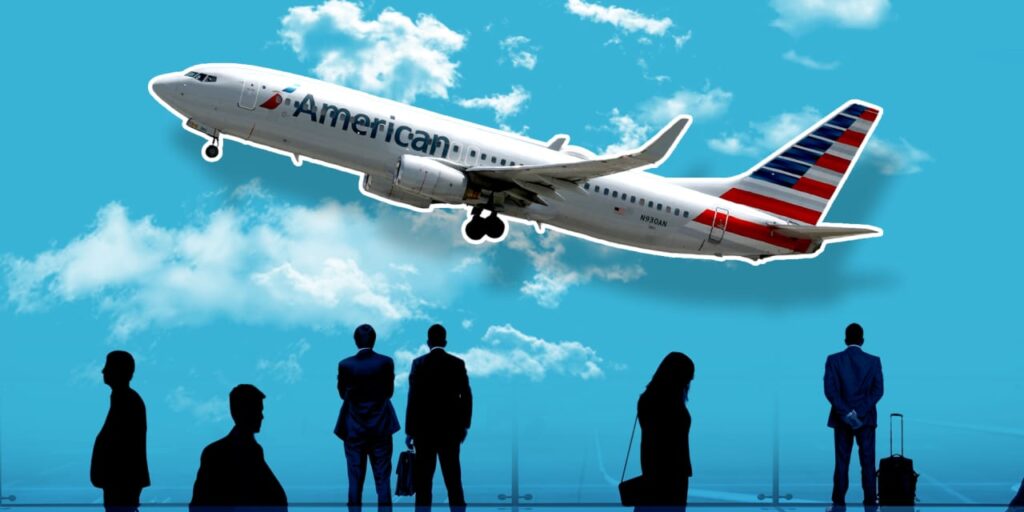American Airlines will soon stop letting customers earn frequent-flier miles when they book trips on third-party travel sites — and the change will hurt some road warriors more than others.
At the moment, American Airlines
AAL,
passengers can earn miles when they buy a ticket via third-party websites such as Expedia
EXPE,
or their credit card’s travel-booking portal. Currently, there are some restrictions on how many miles travelers earn on basic economy-class tickets purchased on third-party sites.
But after May 1, if travelers want to earn miles for American’s AAdvantage program on their purchases of any flight they have to make the purchase directly from American Airlines, or through an agency or third-party travel site recognized by the airline. The airline hasn’t yet released a list of these preferred third-party sites, but says it will do so in April.
In another blow to travelers’ wallets, the carrier also announced that it will increase fees for checked bags from $30 to $35 for the first bag, and $40 to $45 for the second.
While American says that most AAdvantage Miles members won’t be affected by the new rules, some travel experts say the restrictions will penalize everyday travelers, especially those who spend a long time searching for cheaper tickets. It will be a bigger inconvenience for those comparing fares at different sites, to say the least, said Gunnar Olson, flight-deal analyst at Thrifty Traveler.
“This is just another way in which the airlines are making everybody double-check and triple-check everything before they make bookings so you don’t get stuck with a fare that you really didn’t want in the first place,” he told MarketWatch.
Airlines want to push travelers to buy more premium tickets — those first-class and the business-class seats that bring in more money, Olson added. In the past decade, many airlines have come up with restrictions on basic-economy seats, such as checked-bag fees, and boosted the rewards for their loyalty programs.
The result is that leisure travelers lose the most, said Chris Elliott, a consumer advocate and journalist.
“The losers are going to be regular air travelers who are just trying to get a good deal and maybe enough frequent-flier miles to have a flight at the end of the year to visit grandma for Thanksgiving,” said Elliott. Elites — those hardcore business travelers who have tons of miles — are not among those impacted, he added, especially by the increased baggage fees. “Corporate travelers are the ones with a credit card. They all get quote-unquote, ‘free checked bags,’” Elliott said.
““Almost every airline is pursuing some sort of NDC strategy, so they’re all trying to do the same thing.””
However, about 80% or more of AAdvantage Miles members will still be able to earn miles as they do now after May 1, an American Airlines spokesperson told MarketWatch in an email.
The airline will continue to allow travelers to earn frequent-flier miles when they book on third-party sites that use a new booking system known as “New Distribution Capability.” The system displays more features such as seat selection, and can “provide more relevant, tailored offers to our customers,” the carrier said on its website. Many major travel sites such as Expedia have already adopted the new technology.
It’s possible that other airlines could follow suit and push third-party sites to use the new booking system, travel experts and aviation analysts told MarketWatch. Aside from the new system being more user-friendly, it’s also a lot cheaper for airlines and for passengers. Airlines usually offer cheaper prices to passengers through sites that use the NDC system compared to non-NDC sites.
“Almost every airline is pursuing some sort of NDC strategy, so they’re all trying to do the same thing,” said Jeff Klee, CEO of corporate travel platform AmTrav. “I think there will be a lot of changes in how airline tickets are sold and who’s selling them,” Klee told MarketWatch.
Will I still be able to earn frequent-flier miles if I book travel on Expedia, Travelocity, Kayak or another travel site?
For deal-seekers who are searching for cheaper prices via major online travel agencies such as Expedia, the good news is that most of those sites have adopted the new technology, which means they will likely be on American’s list of preferred providers.
Big global distribution systems — such as Amadeus
AMADY,
and Travelport, as well as major travel agencies and aggregators such as Expedia and Booking.com
BKNG,
— have adopted the new system, according to aviation analytics company OAG.
But it could be hard for smaller, mom-and-pop travel agencies to implement the change quickly, said Zach Griff, senior aviation writer with the Points Guy. Those businesses usually have less support to navigate through a new infrastructure change and many employees of travel agencies have little access to the new technology or are not familiar with it, according to OAG.
Expedia, Kayak
BKNG,
Travelport and Booking.com did not immediately respond to a request for comment.
Will I still be able to earn frequent-flier miles as a business traveler?
It depends on whether those travelers work for an employer that has a relationship with American Airlines, but most corporate travelers will not be affected by the policy change.
Business travelers who work for companies that have contracts with American Airlines are not affected by the new rules, the carrier said when announcing the change. Those travelers can still earn miles wherever they purchase their tickets. This includes AAdvantage Business members, a category the airline introduced last year, for travelers with medium or smaller-sized businesses.
Most big corporations have contracts with major airlines, Griff said. But travelers from smaller companies may have to navigate this change on their own.
Will I still be able to earn AAdvantage miles when I book flights through a credit-card portal?
People who book their flights through their credit card’s travel portal are facing more uncertainty, analysts told MarketWatch.
Some credit-card companies partner with other online travel agencies and outsource the booking process to agencies that use the new system that American prefers, said Cory Garner, who runs an independent airline advisory company Garner in Dallas, Texas.
But some credit-card companies still use the old technology and may have some difficulty meeting the requirement by American Airlines, he said. In addition to that, it’s uncertain whether American Airlines will see those credit-card companies as competitors of its own credit-card lines and act on that, Garner said. Airlines also operate their own credit cards and they often generate important revenue for the company.
But using credit-card travel portals may not offer the best deals for consumers. An American Airlines spokeswoman told the Wall Street Journal recently that credit-card travel portals that use the older distribution technology do not have the same access as others to American Airlines’ cheaper fares.
Read the full article here












